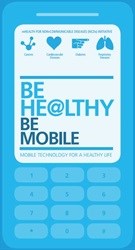Mobile phone app helps diabetics in Senegal
Diabetics in Senegal can now receive - for the first time - free, daily text messages with recommendations for fasting before, during and after the Muslim holy month of Ramadan.
mRamadan, is part of the Be He@lthy Be Mobile program, a joint initiative by the World Health Organisation and the International Telecommunication Union that aims to help countries fight non-communicable diseases.
The goal of mRamadan is to help diabetic patients in Senegal safely manage their illness and reduce the number of emergency hospitalisations that normally peak during Ramadan.
Complications while fasting
While Islam exempts anyone too young, old, pregnant, or not in good health from fasting, many diabetics say they do try to abstain from food and drink during Ramadan. They also sometimes stop taking insulin injections, which are needed to regulate blood glucose levels.
Dr Maimouna Ndour Mbaye, a professor of internal medicine and diabetology who works at the Marc Sankale National Diabetes Centre in Dakar, said diabetics can face a number of complications while fasting.
"The first risk is hypoglycemia, which can be very harmful to the brain, in particular," she said. "There is also a risk of hyperglycemia, because when they fast, their diabetes is less controlled. They cannot take their medication on a regular basis as they do on a normal day. And this is a risk... and exposes [patients] to complications."
Mbaye said diabetics are also at an increased risk of dehydration. People with diabetes who have existing conditions, such as chronic kidney problems, are usually not advised to fast, as such conditions can worsen. She said that all diabetics should consult with their physicians before deciding if it is safe not to eat.
Reminders via the app
Ndiaga Diop, 26, who was diagnosed with Type-1 diabetes when he was eight years old, said mRamadan is proving to be a useful tool for people with diabetes in Senegal.
"Before, we had many diabetics who didn't know what to do during Ramadan, whether they should fast or not, but now with the program, it helps you know what to do while fasting," he said. "Each day we receive messages with advice about what to do or not do. So it's a very good thing and really helps people."
Some of the messages include reminding people to drink at least a litre of water each morning before beginning the fast, how to adjust the timing and dosage of diabetes medications, and not to eat too many sugary foods, such as dates, in the evening.
Once Ramadan is over, participants will continue to receive messages about the importance of checking in with a doctor to make sure their diabetes is still well-controlled, and to maintain a healthy and active lifestyle.







